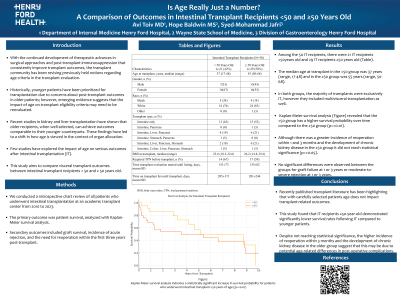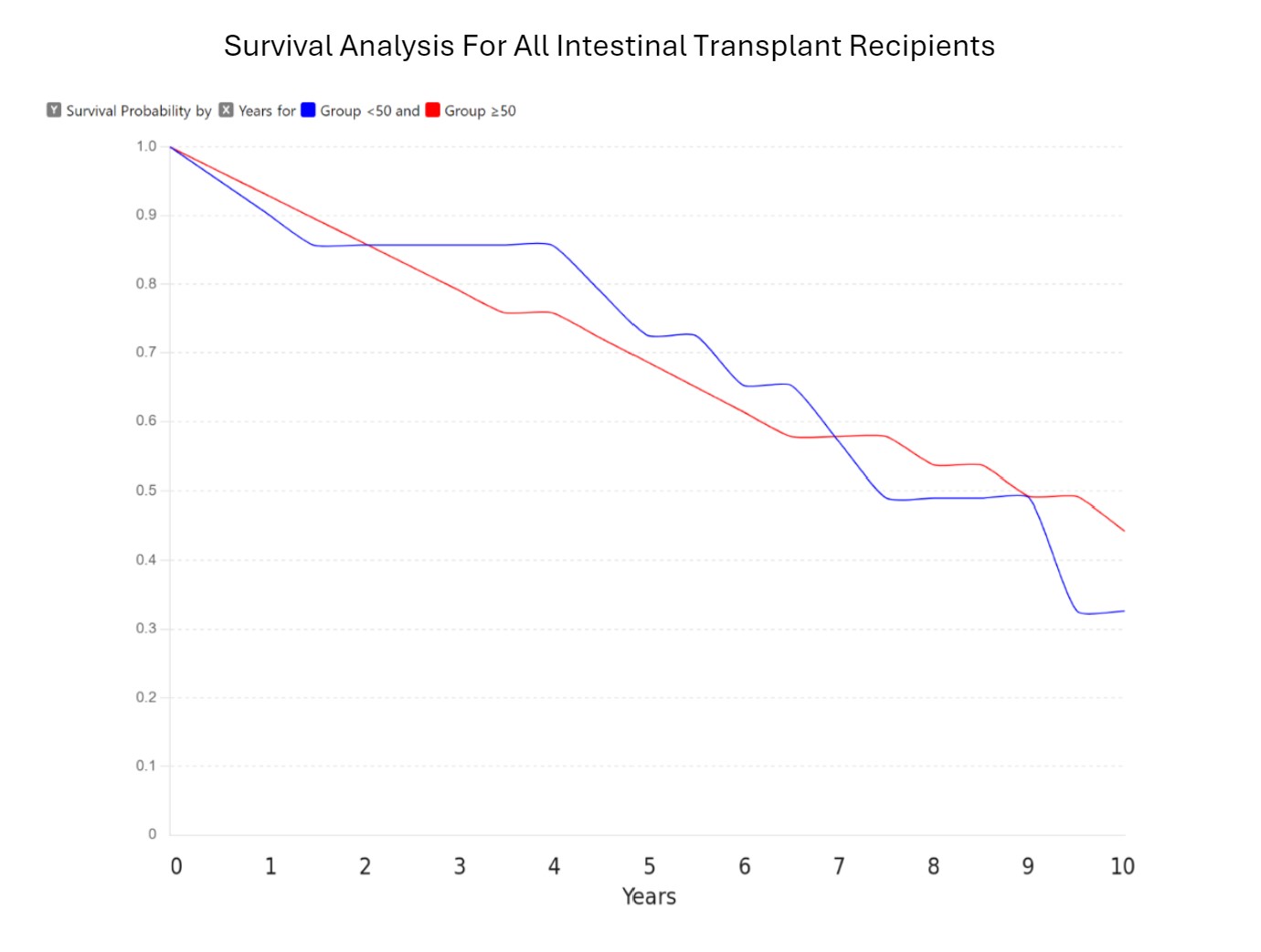Monday Poster Session
Category: Small Intestine
P3193 - Is Age Really Just a Number? A Comparison of Outcomes in Intestinal Transplant Recipients <50 and ≥50 Years Old
Monday, October 28, 2024
10:30 AM - 4:00 PM ET
Location: Exhibit Hall E

Has Audio

Avi Toiv, MD
Henry Ford Hospital
Detroit, MI
Presenting Author(s)
Avi Toiv, MD1, Hope Baldwin, BS2, Syed-Mohammed Jafri, MD3
1Henry Ford Hospital, Detroit, MI; 2Wayne State University School of Medicine, Detroit, MI; 3Henry Ford Health, Detroit, MI
Introduction: With the continued development of therapeutic advances in surgical approaches and post-transplant immunosuppression that consistently improve transplant outcomes, the transplant community has been revising previously held notions regarding age criteria in the transplant evaluation. Historically, younger patients have been prioritized for transplantation due to concerns about post-transplant outcomes in older patients; however, emerging evidence suggests that the impact of age on transplant eligibility criteria may need to be reevaluated. Few studies have explored the impact of age on serious outcomes after intestinal transplantation (IT). This study aims to compare visceral transplant outcomes between IT recipients < 50 and ≥ 50 years old.
Methods: We conducted a retrospective chart review of all patients who underwent IT at an academic transplant center from 2010 to 2023. The primary outcome was patient survival, analyzed with Kaplan-Meier survival analysis.
Results: Among the 50 IT recipients, there were 21 IT recipients < 50years old and 29 IT recipients ≥50 years old (Table). The median age at transplant in the < 50 group was 37 years (range, 17-48) and in the ≥50 group was 55 years (range, 50-68). In both groups, the majority of transplants were exclusively IT, however they included multivisceral transplantation as well. Kaplan-Meier survival analysis (Figure) revealed that the < 50 group has a higher survival probability over time compared to the ≥50 group (p=< 0.01). Although there was a greater incidence of reoperation within 1 and 3 months and the development of chronic kidney disease in the ≥50 group it did not reach statistical significance (p= >0.05). No significant differences were observed between the groups for graft failure at 1 or 3 years or moderate-to-severe rejection at 1 or 3 years.
Discussion: Although recently published transplant literature has been highlighting that with carefully selected patients age does not impact transplant-related outcomes, this study found that IT recipients ≥50-year-old demonstrated significantly lower survival rates following IT compared to younger patients. Despite not reaching statistical significance, the higher incidence of reoperation within 3 months and the development of chronic kidney disease in the older group suggest that this may be due to potential age-related differences in post-operative complications.

Note: The table for this abstract can be viewed in the ePoster Gallery section of the ACG 2024 ePoster Site or in The American Journal of Gastroenterology's abstract supplement issue, both of which will be available starting October 27, 2024.
Disclosures:
Avi Toiv, MD1, Hope Baldwin, BS2, Syed-Mohammed Jafri, MD3. P3193 - Is Age Really Just a Number? A Comparison of Outcomes in Intestinal Transplant Recipients <50 and ≥50 Years Old, ACG 2024 Annual Scientific Meeting Abstracts. Philadelphia, PA: American College of Gastroenterology.
1Henry Ford Hospital, Detroit, MI; 2Wayne State University School of Medicine, Detroit, MI; 3Henry Ford Health, Detroit, MI
Introduction: With the continued development of therapeutic advances in surgical approaches and post-transplant immunosuppression that consistently improve transplant outcomes, the transplant community has been revising previously held notions regarding age criteria in the transplant evaluation. Historically, younger patients have been prioritized for transplantation due to concerns about post-transplant outcomes in older patients; however, emerging evidence suggests that the impact of age on transplant eligibility criteria may need to be reevaluated. Few studies have explored the impact of age on serious outcomes after intestinal transplantation (IT). This study aims to compare visceral transplant outcomes between IT recipients < 50 and ≥ 50 years old.
Methods: We conducted a retrospective chart review of all patients who underwent IT at an academic transplant center from 2010 to 2023. The primary outcome was patient survival, analyzed with Kaplan-Meier survival analysis.
Results: Among the 50 IT recipients, there were 21 IT recipients < 50years old and 29 IT recipients ≥50 years old (Table). The median age at transplant in the < 50 group was 37 years (range, 17-48) and in the ≥50 group was 55 years (range, 50-68). In both groups, the majority of transplants were exclusively IT, however they included multivisceral transplantation as well. Kaplan-Meier survival analysis (Figure) revealed that the < 50 group has a higher survival probability over time compared to the ≥50 group (p=< 0.01). Although there was a greater incidence of reoperation within 1 and 3 months and the development of chronic kidney disease in the ≥50 group it did not reach statistical significance (p= >0.05). No significant differences were observed between the groups for graft failure at 1 or 3 years or moderate-to-severe rejection at 1 or 3 years.
Discussion: Although recently published transplant literature has been highlighting that with carefully selected patients age does not impact transplant-related outcomes, this study found that IT recipients ≥50-year-old demonstrated significantly lower survival rates following IT compared to younger patients. Despite not reaching statistical significance, the higher incidence of reoperation within 3 months and the development of chronic kidney disease in the older group suggest that this may be due to potential age-related differences in post-operative complications.

Figure: Kaplan-Meier survival analysis for all intestinal transplant recipients noting a higher survival probability over time in the <50 group compared to the ≥50 group (p=<0.01).
Note: The table for this abstract can be viewed in the ePoster Gallery section of the ACG 2024 ePoster Site or in The American Journal of Gastroenterology's abstract supplement issue, both of which will be available starting October 27, 2024.
Disclosures:
Avi Toiv indicated no relevant financial relationships.
Hope Baldwin indicated no relevant financial relationships.
Syed-Mohammed Jafri: Gilead, Takeda, Abbvie, Intercept, VectivBio – Advisor or Review Panel Member, Speakers Bureau.
Avi Toiv, MD1, Hope Baldwin, BS2, Syed-Mohammed Jafri, MD3. P3193 - Is Age Really Just a Number? A Comparison of Outcomes in Intestinal Transplant Recipients <50 and ≥50 Years Old, ACG 2024 Annual Scientific Meeting Abstracts. Philadelphia, PA: American College of Gastroenterology.
